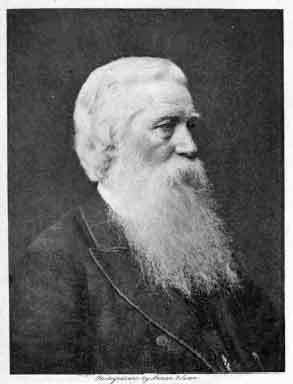Randy Alcorn's Blog, page 146
July 27, 2016
To “Live and Die Serving and Honoring the Lord Jesus”: Missionary John G. Paton
 John G. Paton (1824-1907) served as a missionary in the South Pacific’s New Hebrides islands. Less than twenty-five years earlier, natives clubbed to death the first two missionaries to visit the island, just fifteen minutes after they landed on the beach. The natives then cooked and ate the murdered men in sight of the ship that brought them there. No one dared return to the islands, until Paton did. His first weeks there, illness took his young wife; one week later, their infant died. He suffered intensely. But note Paton’s perspective as he looked back on this years later:
John G. Paton (1824-1907) served as a missionary in the South Pacific’s New Hebrides islands. Less than twenty-five years earlier, natives clubbed to death the first two missionaries to visit the island, just fifteen minutes after they landed on the beach. The natives then cooked and ate the murdered men in sight of the ship that brought them there. No one dared return to the islands, until Paton did. His first weeks there, illness took his young wife; one week later, their infant died. He suffered intensely. But note Paton’s perspective as he looked back on this years later:
Oftentimes, while passing through the perils and defeats of my first years in the Mission field on Tanna, I wondered, and perhaps the reader hereof has wondered, why God permitted such things. But on looking back now, I already clearly perceive... that the Lord was thereby preparing me for doing... the best work of all my life: the kindling of the heart of Australian Presbyterianism with a living affection for these Islanders of their own Southern Seas... and in being the instrument under God of sending out missionary after missionary to the New Hebrides, to claim another island and still another for Jesus. That work, and all that may spring from it in time and Eternity, never could have been accomplished by me, but for first the sufferings and then the story of my Tanna enterprise! [1]
Because of Paton’s story, nearly one in six Presbyterian ministers in Australia left to serve God as missionaries. Only in eternity will we know the full effect of his sufferings.
Years earlier, as a successful young Scottish preacher, Paton determined to leave Glasgow to minister to this unreached people group. But most of his Christian friends urged him to do something more sensible with his life. Paton wrote,
Amongst many who sought to deter me, was one dear old Christian gentleman, whose crowning argument always was, “The Cannibals! You will be eaten by Cannibals!” At last I replied, “Mr. Dickson, you are advanced in years now, and your own prospect is soon to be laid in the grave, there to be eaten by worms; I confess to you, that if I can but live and die serving and honoring the Lord Jesus, it will make no difference to me whether I am eaten by Cannibals or by worms; and in the Great Day my resurrection body will arise as fair as yours in the likeness of our risen Redeemer. [2]
Paton suffered much in his forty-three years in the New Hebrides, where he buried his wife and child, and endured grave illnesses, shipwreck, the betrayal of friends and some converts, and grief over martyred co-workers. On the other hand, John Paton lived to see Christ transform an entire culture, and to witness hundreds of missionaries follow behind him.
When he died, Paton could anticipate hearing words that would compensate for every evil and suffering he endured, words spoken by Jesus in Matthew 25:21: “Well done, good and faithful servant! You have been faithful with a few things; I will put you in charge of many things. Come and share your master’s happiness!”
[1] John Gibson Paton, John G. Paton, Missionary to the New Hebrides (Grand Rapids, MI: Fleming H. Revell, 1898) 359–60.
[2] Paton, John G. Paton, 91.
July 25, 2016
Looking Ahead to the Likelihood of Increased Persecution in America

Several months ago I was asked by World Magazine some questions about religious persecution. Here are my responses.
There’s a lot of talk in evangelical circles about the likelihood of increased persecution of believers in the years ahead. Do you think that forecast is on target?
Yes. However, I don’t believe we should live in fear and dread of persecution, but realize that God tells us to expect it (2 Timothy 3:12) and not to be surprised by it (1 Peter 4:12). He promises to use it to increase our perseverance and build our character (Romans 5:3-5), and increase our happiness in Christ (Luke 6:22-23). God will use persecution, as He always has, to thereby strengthen His church and extend the Gospel message, not destroy it. Persecution in America will probably never be as extreme as it has been in countless places throughout church history and as it is around the world today.
So, sure, let’s hang on to what liberties we can, but not whine and complain like a disgruntled special interest group. Instead let’s focus on sharing Jesus and the Gospel.
What form do you think such persecution is most likely to take?
Hate speech will be broadened to include any traditional or faithful teaching of Scripture dealing with homosexuality. Christians, pastors and biblical scholars who reinterpret the homosexuality passages to fit the modern worldview will be cited to argue that local church pastors are not really teaching the Bible but a particular primitive and hate-filled interpretation of the Bible, one that is fueling rage against gay citizens, resulting in disdain, discrimination and in some cases violence against them. It will be compared to the hateful oratory against Jews in some Christian congregations in Nazi Germany, which helped fuel the Holocaust.
Refusal to serve communion to, perform marriages of, or accept into membership legally married gay couples, and refusal to hire an otherwise qualified homosexual teacher in Christian schools and churches will result in lawsuits, the removal of tax-exempt status, and eventually perhaps the closure of some Christian schools and churches. Those who avoid teaching on the related biblical texts or reinterpret them in socially acceptable ways will thereby avoid persecution and gain praise and status. Countless churches across the country rent facilities from public schools on Sundays, which is good stewardship for the churches and provides needed income to the school districts. Many of these churches have wonderful relationships with school principals, and volunteer hundreds of hours annually to make improvements that benefit the schools. However, these churches and schools are on borrowed time. Eventually I believe schools renting their facilities to people whose worldview is considered discriminatory or hateful will not be permitted to do so.
The price paid by the silent churches will be subjecting themselves to God’s judgment by failing to preach the whole counsel of God (Acts 20:27); the price paid by the compromised churches will be embracing false and self-serving people-pleasing doctrine by twisting Scripture and ultimately undermining the Gospel itself (2 Timothy 4:3-4). Of course they will do this in the name of the love of Jesus, quoting Jesus’ words in John 8 “Neither do I condemn you,” while ignoring His words a few verses later, “Go and sin no more.”
Pastors and Bible teachers who reinterpret Scripture to make it popular will increasingly take the moral high ground as they portray real Bible-believers as bigots. Of course, some ARE bigots. But the kindest and most Christ-like and grace-centered believers will be marginalized and labeled hateful despite their loving actions. They are the ones whose hearts break for gay and transgender people, and every other broken person including themselves and their loved ones, and who believe that love doesn’t mean refusal to tell the truth, but means acting in what God says are people’s true and ultimate best interests.
So what should we do?
Let’s not be surprised by this or talk about a “Christian America,” which never existed in full flower in the first place, and is today further from reality than ever….but not as far as it will be ten and twenty and thirty years from now. (Barring a sweeping transformation that seems highly unlikely.)
For the sake of the free proclamation of the Gospel and the continuance of the rights of belief and practice for churches and others, it’s good that some Christian organizations will continue to defend these rights in courts and elsewhere. The rights believers have today were won at great cost in previous generations, and it is irresponsible and unloving to passively look the other way to the detriment of future generations of Christ-followers, including our children and grandchildren. They are in danger of losing their legal rights to live and proclaim and assemble for the Gospel if we fail to speak up and do something to hold on to our rights that people shed blood to procure and defend.
But please, let’s stop portraying ourselves, who have lived most of our lives in unheard of religious liberty, as a whiny special interest group throwing a tantrum. Let’s happily draw attention to Jesus and the right to believe, teach, celebrate, and bring His Good News to all who will listen.
Photo via Unsplash
July 22, 2016
Should Christians Be Spiritual Enough to Not Love God’s Created World?

A few years ago, I spoke at a Desiring God National Conference in a session titled “C.S. Lewis on Heaven and the New Earth: God's Eternal Remedy to the Problem of Evil and Suffering.” One of the things I shared is the irony that in a day when many people edit theology to fit their desires, they ignore biblical truths about eternity that are far more desirable than what they falsely believe.
Shouldn’t we embrace the true biblical teaching of the resurrection and the New Earth and let ourselves and our children be excited about them? First, because it’s true, but with the added plus that it’s wonderful, so much better than we could ever have imagined!
Recently I came across this response to the video:
Let’s just make it through this life and leave the rest to God. Sounds like a great passion for the least important thing you could find in the Bible. Confusing your children 101. Preaching about a New Earth and body would probably appeal to non-Christians that love this world.
This comment reflects the misguided idea that we should be “spiritual” enough as Christians to not love God's created world. Believers who embrace this philosophy mistake the sinful world affected by the curse and the devil for the world God created for beauty and wonder and worship. To call the New Earth, which is itself inseparable from the doctrine of resurrection, “the least important thing you could find in the Bible” is staggering.
One of my concerns with such thinking is that our failure to teach about the meaning of resurrection and the New Earth actually pushes children in Christian homes away from the gospel and the church. Why? Because they are, in essence, told to find their happiness in the present world, since this life (we make them suppose) is their only chance to enjoy beauty, pleasures, art, and culture. The secular world, it seems, offers an unending smorgasbord of promised happiness. Seekers move from one false promise to another, ending in ruins before they discover what Solomon learned—that all these promises of happiness are empty. They are wind and vapor, not substance and reality.
Suppose instead, that churches taught and Christians believed that God calls them to view work, play, music, food, and drink as gracious gifts from God’s hand to be responsibly enjoyed within the parameters of His commands. If this were the reality, perhaps less young people raised in believing homes would see the Christian life divorced from pleasure, and that a relationship with Christ is the best and true way to experience lasting happiness, both in this life and in the one to come.
Unfortunately, ever since some of the church fathers were heavily influenced by the Greek philosophers, a hyper-spiritualized approach to Scripture and the Christian life has infected segments of the Western church. It has crippled people’s ability to understand what Scripture says about the goodness of God’s creation, as well as the delight and happiness He intends for us in the physical dimension. (Once, after I preached about the Resurrection and New Earth, a fine Christian man said to me, “This idea of having bodies and eating food and living in an earthly place . . . it just sounds so unspiritual.”)
Though Christoplatonism frowns upon the pleasures of the physical world, mistaking asceticism for spirituality, Scripture says we’re to put our hope not in material things but “in God, who richly provides us with everything for our enjoyment” (1 Timothy 6:17).
Why did God make our taste buds for us to enjoy food and dopamine to be generated in the “pleasure centers” of our brains? Why did He give us our ability to find joy in a cool swim and a hot shower, in listening to music and audiobooks, in hitting a golf ball, skiing down a slope, or running through a park? Why did He give us physical senses if not to know Him better and to be far happier in Him than we ever could be if He had instead made us disembodied spirits who couldn’t enjoy physical pleasures?
If we believe the physical world is evil, inferior, or unspiritual, we’ll inevitably be suspicious of everything in it. We’ll look down our noses at good food and wine, art and music (unless explicitly Christian), sports and culture, hobbies and recreation, drama and amusements. We will berate the notion of happiness because, after all, happiness is “worldly.” We’ll come to the conclusion that God’s people should be concerned only about holiness and perhaps some unemotional, transcendent concept called “joy” that never makes its way to our faces. We’ll also inevitably reject or spiritualize any biblical revelation about bodily resurrection or finding joy in God’s physical creation.
But this isn’t consistent with a biblical worldview. Scripture is clear that physical pleasures and even temporal happiness, such as what we experience from a good meal, fine art, and adventure, are from God, not Satan. Paul says it is demons and liars who portray the physical realm as unspiritual, forbid people from the joys of marriage, including sex, and “order them to abstain from certain foods, which God created to be received with thanksgiving by those who believe and know the truth. For everything God created is good, and nothing is to be rejected if it is received with thanksgiving, because it is consecrated by the word of God and prayer” (1 Timothy 4:3-5).
Although preoccupation with a God-given gift can turn into idolatry, enjoying that same gift with a grateful heart can draw us closer to God. In Heaven we’ll have no capacity to turn people or things into idols. When we find joy in God’s gifts, we’ll be finding our joy in Him.
C. S. Lewis wrote, “There is no good trying to be more spiritual than God. God never meant man to be a purely spiritual creature. That is why He uses material things like bread and wine to put the new life into us. We may think this rather crude and unspiritual. God does not: He invented eating. He likes matter. He invented it.”
Consider the old proverb, “Eat, drink, and be merry, for tomorrow we die.” It assumes that the only earthly pleasures we’ll ever enjoy must be obtained now. As Christians, we should indeed eat, drink, and be merry—and also sacrifice, suffer, and die—all to the glory of God. In doing so, we’re preparing for an eternal life in which we’ll eat, drink, and be merry, but never again die. So this present life isn’t our last chance to eat, drink, and be merry—rather, it’s the last time our eating, drinking, and merrymaking can be corrupted by sin, death, and the Curse.
Every day we should see God in His creation: in the food we eat, the air we breathe, the friendships we enjoy, and the pleasures of family, work, and hobbies. Yes, we must sometimes forgo secondary pleasures, and we should never let them eclipse God. And we should avoid opulence and waste when others are needy. But we should happily thank God for all of life’s joys, large and small, and allow them to draw us to Him, and to point our hearts toward the coming New Earth.
Photo via Unsplash
July 20, 2016
Is Joy Unemotional, and Is It More Spiritual Than Happiness?

A Christian writer says, “We don’t get joy by seeking a better emotional life, because joy is not an emotion. It is a settled certainty that God is in control.”[i] Another says, “Joy is not an emotion. It is a choice.”[ii]
The idea that “joy is not an emotion” promotes an unbiblical myth. Yet that statement appears online more than 17,000 times, virtually all of them by Christians. Most unbelievers rightly realize that happiness, gladness, and joy are synonyms, and they involve real emotions, which are not bad, but good.
A Bible study says, “Spiritual joy is not an emotion. It’s a response to a Spirit-filled life.”[iii] But if this response doesn’t involve emotions of happiness or gladness, what makes it joy? Some claim that joy is a fruit of the Spirit, not an emotion. But in Galatians 5:22, love and peace surround the word joy. If you love someone, don’t you feel something? What is peace if not something you feel?
Hannah Whitall Smith gave her son this advice:
Say night and morning, and whenever through the day you think of it, “Dear Lord make me happy in you,” and leave it there. All the rest will come out right when once you are happy in Him. And this happiness will be the beginning; remember; “love, joy and peace” are the first fruits mentioned.[iv]
A hundred years ago, every Christian knew the meaning of joy. Today, if you ask a group of Christians, “What does joy mean?” most will grope for words, with only one emphatic opinion: that joy is different from happiness. This is like saying that rain isn’t wet or ice isn’t cold. Scripture, dictionaries, and common language don’t support this separation.
I googled “define joy,” and the first result was this dictionary definition: “a feeling of great pleasure and happiness.” This definition harmonizes with other dictionaries and ordinary conversations, yet it contradicts countless Christian books and sermons. The church’s misguided distinction between joy and happiness has twisted the words. Christian psychiatrist George Vaillant says, “Happiness is secular, joy sacred.”[v] So we should be joyful but not happy when reading the Bible, praying, and worshiping? Is the Christian life really divided into the secular and sacred, or is every part of our lives, even the ordinary moments, to be centered in God?
I share more in this video interview with Faithlife's Daniel Di Bartolo.
[i] Greg Forster, The Joy of Calvinism: Knowing God’s Personal, Unconditional, Irresistible, Unbreakable Love (Wheaton, IL: Crossway, 2012), 147–48.
[ii] Ricardo Sanchez, It’s Not Over (Lake Mary, FL: Charisma House Book Group, 2012), 144.
[iii] Elizabeth George, Walking with the Women of the Bible: A Devotional Journey through God’s Word (Eugene, OR: Harvest House, 1999), 28.
[iv] Hannah Whitall Smith, The Christian’s Secret of a Holy Life: The Unpublished Personal Writings of Hannah Whitall Smith, ed. Melvin E. Dieter (Oak Harbor, WA: Logos Research Systems, 1997).
[v] George Vaillant, “The Difference Joy Makes: Finding Contentment through Psychotherapy and Christian Faith,” Conference at the Institute of Religion, Houston, October 8–9, 1998.
Photo via Unsplash
July 18, 2016
Facing Fear with Faith

Fear comes in many forms. We can fear making the wrong decision or disappointing our friends. We can also fear that our children will be snatched, the car brakes will fail, or the plane will crash. We may experience fear about our country’s future and the direction of the world around us.
Our immediate response to a threatening situation like a loud noise or a scream is usually a reflexive or involuntary fear. This initial fear is uncontrollable. What we allow to settle into our minds and emotions after our initial response, however, is controllable. If we do not exercise control over it, if we leave the initial fear untamed, it turns into long-term dread or even paranoia.
Unhealthy fear can be a symptom of a lack of eternal perspective. Ed Welch writes, “Fears see only in part. They see that we might lose something dear to us, such as our money, our health or the health of someone we love. They see the potential for loss with microscopic acuity. But they don’t see God’s presence, they don’t see His faithfulness to His promises, they don’t fixate on unseen realities but are dominated by what is merely seen with the naked eye (2 Corinthians 4:18).”
We’re told that “For God gave us a spirit not of fear but of power and love and self-control” (2 Timothy 1:7).
Whether you suffer from specific phobias, a chronic fear of harm or death to yourself or loved ones, or any other fear, here are some suggestions for handling them.
Three Strategies for Fighting Fear
Face your fears by sharing them. Fear thrives most when it lurks in the shadows. Tell someone else and you’ll find that fears are more common than you think. Many people suffer from what could be called “fear phobia.” They’re afraid their fear means they are abnormal.
Sharing your fears with someone you trust, and finding out others struggle with similar issues, may bring you relief and help make them easier to handle.
Starve your fears—don’t feed them. Once a fear is shared, it should not be dwelt on. Talking too much about fears tends to feed or reinforce them, making it more difficult to shake them.
Another area to check is your viewing habits. What are you taking in through television, movies, the internet, and social media? We can’t fill our mind with what is evil and dreadful and expect to be at peace!
If you fear violence to yourself and your family, it’s better that you don’t watch violent movies and television programs that feed your fears. For that matter, you’d do better not to read the newspaper or watch the news on television since they major in violent crimes and catastrophes. Studies show that chronic television watchers see the world as being far more dangerous than it really is.
Shift your focus away from your fear and toward God. Read Scripture, memorize it, and pray about your fear. There are hundreds of “fear nots” in the Bible. The most common statement is, “Fear not, for I am with you” (Genesis 26:24). God knows our frailties and fears, and He is quick to reassure us:
Be strong and courageous. Do not be terrified; do not be discouraged, for the LORD your God will be with you wherever you go (Joshua 1:9, AMP).
God has said, “Never will I leave you; never will I forsake you.” So we say with confidence,
“The Lord is my helper; I will not be afraid. What can man do to me?” (Hebrews 13:5–6, NIV)
I sought the LORD, and he answered me; he delivered me from all my fears. (Psalm 34:4, NIV)
Charles Spurgeon said, “The fear of God is the death of every other fear; like a mighty lion, it chases all other fears before it.” Scripture is full of commands to fear God and it is also full of commands not to be afraid. If you fear God, you need fear no one and nothing else, even the devil. If you do not fear God, you will ultimately fear many things besides Him. We’re told that “In the fear of the LORD one has strong confidence” (Proverbs 14:26).
What If?
But what if your fears do happen or have already happened? Ed Welch put it this way: “Our worst fears may come upon us, but we cannot imagine the immense grace that God will pour out on us for them.”
It can help to remind yourself that even if one of your fears becomes reality, God has promised He will use it for your eternal good (Romans 8:28). Everything that comes into your life—yes, even evil and suffering—is Father-filtered. There is great comfort in meditating on your true, eternal circumstances: your Savior has come to deliver you, has secured your resurrection and eternal life, is for you and not against you, and never under any circumstances allows anything to separate you from His love.
We’re told that Christ intercedes for us (Romans 8:34). Since the prayers of a righteous man are effective (James 5:16), what could be more effective than Christ’s prayers for you? What an encouragement to know that even if no one else knows your needs, worries, and fears, and is praying for us, Christ does and is. Robert Murray M’Cheyne wrote, “If I could hear Christ praying for me in the next room, I would not fear a million enemies. Yet distance makes no difference. He is praying for me.”
God’s promise of His presence is a source of both comfort and courage: “Fear not, for I am with you; be not dismayed, for I am your God; I will strengthen you, I will help you, I will uphold you with my righteous right hand” (Isaiah 41:10). Jesus has promised us that no matter what, “I am with you always, even to the end of the age” (Matthew 28:20, NLT).
An Opportunity for Greater Dependence
In a time of dark suffering and dread, David affirmed, “The LORD is my light and my salvation—whom shall I fear? The LORD is the stronghold of my life—of whom shall I be afraid?... Though an army besiege me, my heart will not fear; though war break out against me, even then will I be confident.... Though my father and mother forsake me, the LORD will receive me.... I will see the goodness of the LORD in the land of the living. Wait for the LORD; be strong and take heart and wait for the LORD” (Psalm 27:1, 3, 10, 13–14).
My wife Nanci suffered through what she calls her “year of fear and free-floating anxiety that made me fall in love with God.” Nanci knew God from childhood and trusted Him all through my lawsuits, arrests, and job loss, then through her mother’s death and other losses (and threatened ones). But that inexplicable year of her life, unrelated to any outside traumatic event, changed her. She coped by telling God, morning and night, how much she loved Him.
She has continued her habit of praise and intimacy with God that developed when daily fear and dread fell upon her. The crushing emotions of that time have departed; the sense of intimacy with her Savior remains. To this day Nanci rejoices in God’s love for her and her love for Him in ways she never would have known without that year she otherwise could describe as hellish.
Your struggle with fear can be an opportunity for greater dependence on your Savior, and an opportunity to fix your eyes on what is unseen. John Newton penned it well: “If the Lord be with us, we have no cause of fear. His eye is upon us, His arm over us, His ear open to our prayer—His grace sufficient, His promise unchangeable.”
Photo by Tirza van Dijk, vis Unsplash
July 15, 2016
Pray for Our Brothers and Sisters in Russia, As They’re Losing Their Liberties

In 1991, my friend Steve Keels and I traveled to the Soviet Union, where we had the opportunity to observe believers enjoying the new freedoms to exercise their faith. Lenin’s pictures on statues were everywhere, yet on “Lenin’s Day,” his birthday, we had the privilege of going into the public schools and sharing the gospel ten times in ten different schoolrooms, as well as passing out Bibles. We were told this had never happened in that Ukrainian city. Soviet children listened intently as we told them about the one who died for their sins and is coming to set up a kingdom that will not leave them where Lenin left them—empty, hungry, and without hope.
A city newspaper editor asked to interview us. He asked why we had come to their city, and we responded by giving him a Bible and sharing the gospel. He asked me, “What special words would you say to the people of our city?” He wrote down every word as I replied, “I would encourage them to look to Jesus Christ to fill the emptiness they have inside—and not look to material or political solutions to their ultimate needs, which are spiritual.” We were able in this interview to reach tens of thousands of people with the gospel through a paper that until recently was a propaganda tool of an atheist government.
While this happened in the Ukraine, we also widely distributed Bibles in Russia, not knowing that within eighteen months of our visit the USSR would collapse. At that same time the USA was becoming increasingly restrictive with religious liberties. I vividly recall thinking, “There is now more openness to the Gospel, and opportunity to share it publicly in the Soviet Union than in the United States of America!”
While the USA has seen its religious liberties continue to gradually erode, just twenty-five years after we saw the amazing emergence of freedom in Russia, things have taken a dramatic downward turn for believers there. WORLD reports that:
[On Thursday, July 7], Russian President Vladimir Putin signed into law an “anti-terror” package that includes measures eviscerating religious freedom. The new law requires government permits to preach and teach the gospel, and restricts evangelism essentially to registered church building sites.
The law targets Protestant churches more directly than Orthodox ones. Also, in a gotcha clause, Kremlin spokesman Dmitry Peskov told journalists, “If the law produces any undesired outcomes, the government will introduce measures accordingly by presidential decree.”
A Russian pastor who is a friend of our ministry confirmed this to us, and made these further comments:
Considering that many evangelical churches do not own church buildings, are currently renting different culture houses for their meetings, while experiencing ongoing and ever strong resistance from the powers that be, all of their activities will soon be completely outlawed. Abiding by this law will bring our congregation to a sole purpose—to survive another Sunday. And the choice to exercise our God-given freedom will be considered a criminal offense.
…And, the epitome of it all is the requirement for anyone, who is aware of those “violations”, to REPORT on neighbors, friends or family. NON-ACTION will be viewed as another kind of criminal offense.
Christianity Today also reports that “Foreign visitors who violate the law face deportation. Russia has already moved to contain foreign missionaries. The ‘foreign agent’ law, adopted in 2012, requires groups from abroad to file detailed paperwork and be subject to government audits and raids. Since then, the NGO sector has shrunk by a third, according to government statistics.”
Our friend in Russia asks that we keep Russian believers in our prayers, and that we pray not just for their safety, but for courage to do what is right in the face of trials and tribulations. Though the Russian church may never enjoy the freedoms they’ve had the past two and a half decades, may they be encouraged that Christ’s gospel is bigger than every obstacle. And may those of us in America—who also may continue to lose our religious liberties—be encouraged by the same.
“Therefore let us be grateful for receiving a kingdom that cannot be shaken, and thus let us offer to God acceptable worship, with reverence and awe” (Hebrews 12:28).
Photo via Pixabay
July 13, 2016
Matt Chandler’s Challenge to Men

In this five minute video, Pastor Matt Chandler says something I’ve become increasingly convinced of over the last twenty years. One of my deepest concerns is to see men, young men in particular, who have become increasingly content with doing little in life, sometimes resulting in their wives becoming their caregiver and provider and, effectively, the sole parent of their children.
Some men do not work, but rely on their wives to provide for the family. Many others work relatively short hours in non-demanding jobs. But regardless of how hard they work at our jobs, husbands and fathers, when they come home, need to realize the hard work and challenges of their wives, as the mother of their children, and suck it up and serve their children and wives. They don’t need to waste the evening watching TV or playing video games or endlessly surfing the internet. God has entrusted our wives and children to our care—we are their resident spiritual shepherds.
One of the great ironies of the feminist movement has been, in the name of empowerment, to pressure women to take on the role of both father/provider and mother/caregiver. They end up doing nearly everything.
Husbands who once would have been ashamed that their wives are the primary providers for their home now feel the freedom to hang out at coffee shops and watch TV with their buddies, be addicted to video games, and, sometimes, internet pornography. Too much free time is unhealthy. As Matt Chandler says, “A bored man is a dangerous man.”
Brothers, let’s not waste our lives and fail our wives and children. Let’s rise to the occasion and man-up, to the glory of Jesus, in a culture that has emasculated men and convinced us that our wives and children will do fine without our leadership and hard work.
Photo by James Garcia via Unsplash
July 11, 2016
Problems the USA Is Facing Today…and Our Hope for the Future

In light of all the recent tragic events in our country, it seems a good time to share this blog.* Not long ago a friend asked me to write down for him what I think are some of the important problems our nation is facing today. Here was my response, and those from many other nations may be seeing some of the same things.
Unbelief (failure to trust Christ)
Self-justification, rationalization, and refusal to repent
Nominal, self-serving belief in a God created in our image
Loss of the sense of God's reality and majesty
Idolatry—putting things and people in the place of God
Failure to recognize accountability to God as Judge
Refusal to come to terms with our mortality
Demonization of and disrespect for authority, starting with the Bible's authority (but including demonization of churches and government)
Abortion and other forms of child abuse
Racism and lack of understanding, respect, and compassion for those with different skin
Disrespect and lack of understanding, respect, and compassion for those in law enforcement
Failure to give people the benefit of the doubt; tendency to rush to judgment, misinterpret, misrepresent, and condemn those whose beliefs and politics we disagree with
Self-obsessed political leaders who habitually lie and distort reality
Prevailing sense of entitlement
Presumption that we’ve earned what's in fact been graciously given to us by God and bought by the sacrifices of others
Unthankfulness/ingratitude
Whining, fault-finding
Laziness; lack of discipline and self-control
Lack of contemplation, meditation, and serious thinking
Functional illiteracy
Minimization of gender differences
Human rights abuses
Insensitivity to or selective sensitivity to the plight of the poor and oppressed
Treating women and children as objects rather than subjects
Desensitization to sexual immorality
Superficiality and lack of depth; celebrity worship; celebration of the trivial, neglect of the important
Chronological snobbery: imagining that new ideas and standards are automatically superior to the old
Failure to learn the lessons of history
Worship of youth and making the elderly disposable
Spoiling children by perpetually making them the center of our lives and theirs, resulting in their selfishness, immaturity, laziness, and irresponsibility, which they carry into and through adulthood
In summary, our problems center on our failure to recognize 1) who God is and 2) who we are… humans made in God’s image, yet marred, broken, separated from God, and hell-bound because of our sin.
“What is the matter with the world?” Martyn Lloyd-Jones asked. “Why war and all the unhappiness and turmoil and discord amongst men? …there is only one answer to these questions—sin. Nothing else; just sin.” It’s common to blame the world’s problems on lack of education, opportunity, or resources. If only we knew more, we’d surely be better. No. Our most basic problem is just…sin. The world is inhabited by people like us, sinners in need of redemption, who need the grace of God not just once, but each and every day.
I realize how negative the list is, and my comments that followed it. But it doesn’t mean I’m not hopeful for the future. True, many things going on in the United States and in the world around us are discouraging, but because of the gospel, we can be filled with godly hope: “May the God of hope fill you with all joy and peace in believing, so that by the power of the Holy Spirit you may abound in hope” (Romans 15:13). As believers, our ultimate hope is God’s promise that because of Christ’s redemptive sacrifice, the day is coming when all that is wrong will be made right. That’s the blood-bought promise of Jesus!
Reveling in God’s sovereign grace, Spurgeon said, “Cheer up, Christian! Things are not left to chance: no blind fate rules the world. God hath purposes, and those purposes are fulfilled. God hath plans, and those plans are wise, and never can be dislocated.”
If Spurgeon saying “Cheer up” seems naïve, remember someone else—Jesus—said it first: “I have told you these things, so that you can have peace because of me. In this world you will have trouble. But cheer up! I have won the battle over the world” (John 16:33, CEV).
So what the world’s thirsty people need is for us, as Christ-followers, to reach out our hands and extend to them, as cold water, Christ’s offer of citizenship in another world, a coming eternal home described this way at the Book’s end:
“Now the dwelling of God is with men, and he will live with them. They will be his people, and God himself will be with them and be their God. He will wipe every tear from their eyes. There will be no more death or mourning or crying or pain, for the old order of things has passed away. He who was seated on the throne said, ‘I am making everything new!’” (Revelation 21:3-5).
*If you’d like to read more related to the subject of evil and suffering, see my books If God Is Good and The Goodness of God. Many people have also handed out the If God Is Good booklets.
Photo by Stephanie Anderson, EPM staff
July 8, 2016
Shining Christ’s Light in a Dark World

The light of Christ, shining through others, can bring us great joy and gladness. Jesus said of John the Baptist, “[He] was a burning and shining lamp, and you were willing to rejoice for a while in his light” (John 5:35, ESV). The NCV says, “…you were happy to enjoy his light for a while.”
In a dark world, our hearts are cheered by seeing light wherever it appears. Often light is embodied in a Jesus-follower, in whom we see a secondary reflection of Jesus, who is the Primary, the Light of the world.
I think of my friend Greg Coffey who came to Christ at seventeen, and shined with a great light, then died two years later. I think of the five missionaries murdered in Ecuador in 1956, whose bright light for Christ, along with that of their wives who survived them, drew thousands of young people into missions.
I think of Garland Gabbert, Daniel Brose, and Tom Lytle, older men in our church who drew me and many others into their light. If the chair next to them was open that’s where I would sit, just wanting to be touched by their Christlike wisdom, grace and happiness. Rather than shriveling in heart as they grew older, they became more loving and ministry-minded.
May it be true of me, and all of us…may we draw our light and joy always from Jesus, so that it is never extinguished any more than He can be.
“You are the light of the world. A city set on a hill cannot be hidden. Nor do people light a lamp and put it under a basket, but on a stand, and it gives light to all in the house. In the same way, let your light shine before others, so that they may see your good works and give glory to your Father who is in heaven” (Matthew 5:14-16).
This article also appeared in the new summer issue of our Eternal Perspectives magazine. You can read the entire magazine online.
Photo by Josh Boot, via Unsplash
July 6, 2016
Why Christians Nationwide Should Be Concerned About California’s Religious Liberty Movement, and Senate Bill 1146

Whether or not you’re a resident of California, there’s very good reason to understand and closely follow the developments of SB 1146, a bill that if passed would likely set a precedent for similar legislation nationwide. Ed Stetzer writes that the bill “could destroy the ability of numerous faith-based colleges and universities to pursue the mission for which they were created. SB 1146, one of two similar bills recently introduced into the California legislature, would essentially restrict fully faith-based education to seminaries.” (I encourage you to read the rest of Ed’s excellent article.)
I’ve spoken twice at BIOLA University over the past years, and appreciated my time with the school’s president, Barry Corey, the last time I was there. In this 5-minute video, Barry explains BIOLA’s deep concerns about the legislation, which would greatly impact their school and faith-based colleges and universities all over California.
For the latest news about the bill, check BIOLA’s news page. (You can also follow and read the amendments to the actual bill.) Here’s the most recent status BIOLA has shared:
The legislature will be on recess the entire month of July. However, there will be ongoing efforts to amend the bill with the senator’s office. The bill will be heard by the Appropriations Committee on August 12. Please continue to contact your assemblymember.Visit OpposeSB1146.com for a sample letter and social media posts to use to spread the word.
I don’t think it’s an overstatement to say that legislation such as SB 1146 will profoundly influence the culture in which our children and grandchildren will live. Will they be able to attend institutions of higher learning that are free to educate students according to their faith convictions?
Let’s pray for the legislators involved with SB 1146, as well as for the potentially impacted schools that are speaking out about their concerns. Certainly we should avoid whining and complaining like a disgruntled special interest group. At the same time, we will fail future generations if we don’t speak up and do something to hold on to our rights that people shed blood to procure and defend. But may we always do so with a spirit of grace and truth, honoring the Lord whom we serve.
Photo: Wikimedia Commons, by David Monniaux [GFDL or CC-BY-SA-3.0]



